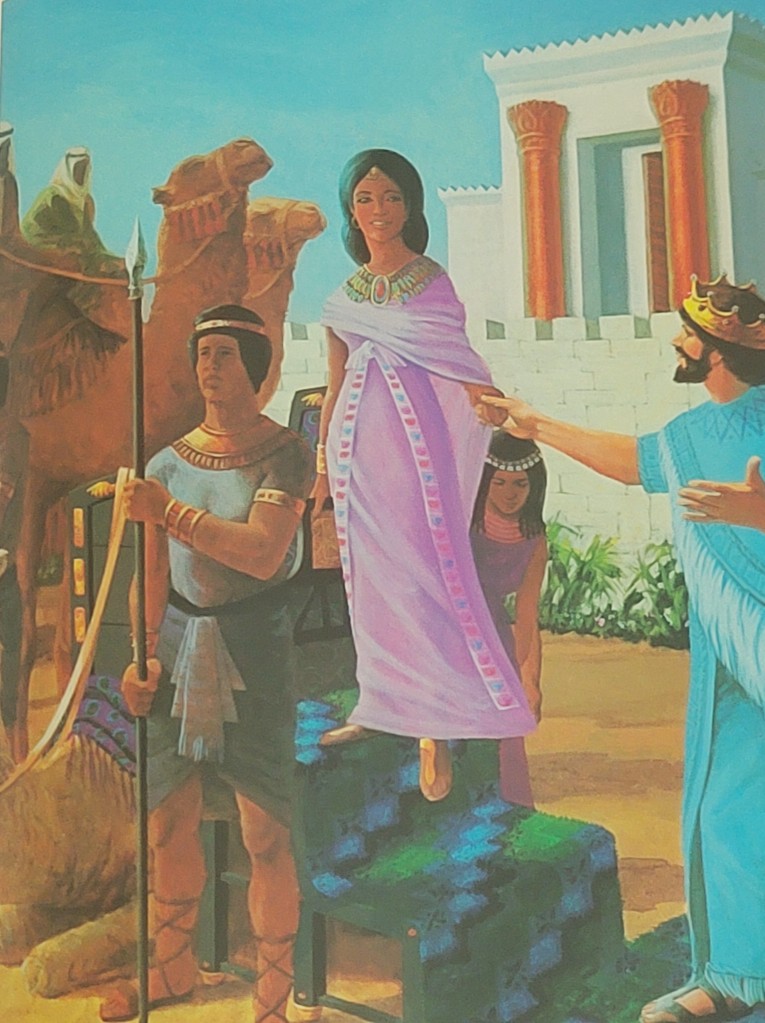
All Jerusalem buzzed with excitement. They had become accustomed to visitors from foreign lands sending gifts to their King to recognize his reputation as a wise and discerning ruler. But today was different; a great ruler of a distant land had come to visit King Solomon. The people watched in awe as her large caravan borne on camels snaked its way through the bustling city toward the palace. The aroma of spices filled the air as they passed. Nothing like it had ever been seen in the city of David before! Crowds lined the streets to take in the rare sight. Passing through the palace gate, the procession stopped, and the Queen of Sheba alighted, a graceful black figure robed in Royal finery and attended by a retinue of servants, officials, and the royal cavalry.
Over the days of her visit, the queen, a devout believer in the one God, engaged the Hebrew King on deep questions of life and death. Solomon undoubtedly would have been enthralled by this exotic queen who traveled so far to converse with him. She must be the ruler of a great people, a civilization equal to any known to him. She brought him spices and gold in abundance and complimented him on his great wisdom declaring, “the half has not been told to me.”
That this Queen of Sheba was a black ruler is strengthened by the words of Jesus in the New Testament, who referred to her as “the Queen of the South, “indicating a kingdom south of Palestine. Moreover, he pointed out she came from “the ends of the earth,” a designation used by the Ethiopian Empire. This was also known as the land of Gold. Geographically, Sheba was located in Southern Arabia in what is now Yemen, then part of the Ethiopian or Kushite Empire. This is also the Biblical Land of Put, where the descendants of Ham were located.
The story also highlights a notable historical feature of African history, that is much more extensive than the other great civilizations. I refer to the prominence of strong female rulers. The Ethiopian Eunuch of Acts 8, who also came on a spiritual mission to Jerusalem was treasurer to one of these outstanding rulers with the title of Candace. Cheikh Anta Diop writes concerning perhaps the greatest of the line of Queen Candace, who “impressed all antiquity by her stand at the head of her troops against the Roman armies of Augustus Caesar. The loss of an eye in the battle only redoubled her courage; her fearlessness and scorn of death even forced the admiration of a chauvinist like Strabo: ‘this queen had courage above her sex.’ African Origins of Civilization, p. 143
The scriptures prophesy in Ps 68:31, “Princes shall come forth out of Egypt; Ethiopia shall soon stretch forth her hands unto God.” These two incidents point to the fulfillment of the prophecy. Even more pointedly, Isaiah predicts, “A multitude of camels will cover you, … All those from Sheba will come; They will bring gold and frankincense, And will bear good news of the praises of the LORD” (Isa 60:6), undoubtedly pointing to the visit of the Magi to worship the Christ child. Beyond that, the prophesy describes the gentiles streaming through the open gates of the New Jerusalem, Mt Zion, the bride of Christ. Consequently, the Queen of Sheba is their spiritual type. She contradicts the false narrative perpetuated by the enemies of the African people that they are the accursed nation of Ham, born to live in subjection to the superior races who claim a monopoly on access to God. It is instructive that the story explicitly states that the reason for the queen’s visit was not only Solomon’s fame but his knowledge of God (1 Kings 10:1). She was driven by the same deep spiritual longing as the Eunuch. A characteristic of the African People throughout their history from ancient times to the present. It has inspired generations of black people to rise above their oppressive situations, reject the racist myths that foster division and self-hatred, and reclaim their spiritual, communal, and personal identity as the people of God. Undoubtedly, the queen returned home with a commitment to share this knowledge with her people.

Dr. Conroy Reynolds has introduced us to a just and accurate hermeneutic of truth telling where Black people and the Biblical data are concerned. It is a refreshing insight into the importance placed by God and biblical history- on the value of Black lives. What he has done is antithetical to the willful misrepresentations and false narratives with which most non black theologians have historically and still today- perpetuate about people of African descent.
I have a sneaky suspicion that he has merely begun to scratch the surface of this truth and as such the full has not yet been told.
This was incredibly insightful.
LikeLike
Dr. Newton,
Your sneaky suspicion is correct, in the words of the Queen, the half has not yet been told. There is so much to be done to correct centuries of deliberate mischaracterization and distortion of black history, spirituality, and even our humanity. Many of the European religions played a central role in this unchristian and inhumane process.
LikeLike